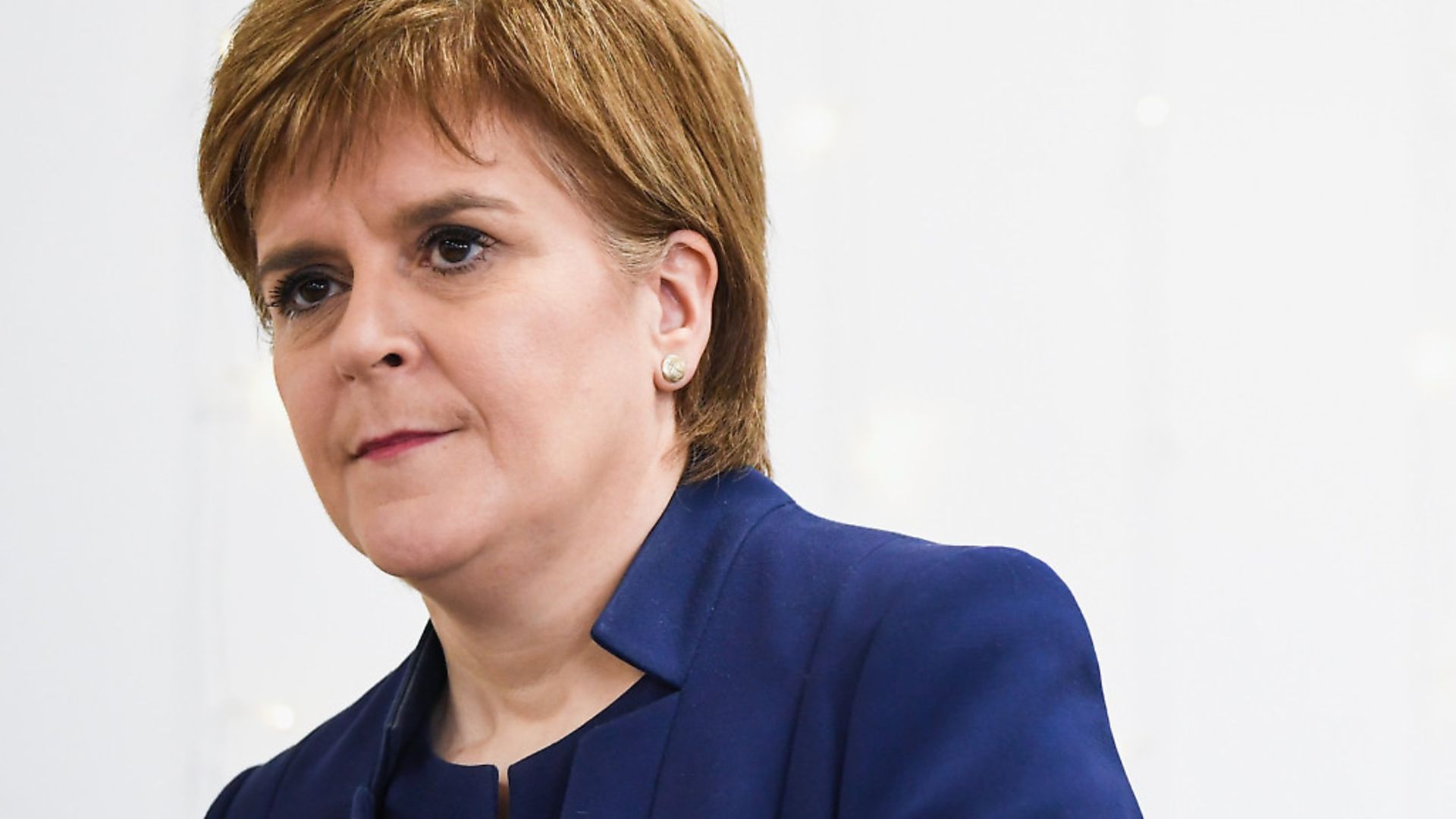
French writer, Marion Van Renterghem, talks to Scotland’s first minister Nicola Sturgeon about nationalism, Brexit and whether her country can ‘take back control’ from Westminster
MVR: What is your priority, support for a People’s Vote or a new referendum on Scottish independence?
NS: We are fighting to protect Scotland’s interests. We are looking at every single option that allows us to do so. We have argued against Brexit, we have argued for the UK to remain as close to the EU as possible, by staying in the single market and the customs union. We certainly would support the option of a second referendum on the EU to try to secure a different outcome. All these options are alive at this stage. Clearly, as we move forward, some of those will fall away and then we’ll take a decision on a referendum on independence.
MVR: Brexit might offer an outside opportunity for Scotland to leave the UK. Is a part of you happy with Brexit?
NS: Absolutely not. It does not make me happy that Brexit is happening. I would prefer the UK to stay in the EU. I would prefer that we’re having a much more positive debate about Scottish independence, than one that was motivated by the disaster that is Brexit. Even if Scotland becomes an independent country, I still think it will be better for both Scotland and the rest of the UK to be in the EU. But Brexit strengthens the argument for Scotland to be independent, yes definitely. Brexit is a good illustration of the point: Scotland, in a few months, is about to leave the EU and 60% of people in Scotland voted against that happening. And yet, we’re not empowered to control it. So here is the argument for being independent in a nutshell.
MVR: You rejected Theresa May’s offer of a meeting last week, to discuss her deal, after she had talked it through with her cabinet. Why?
NS: It is a small example that illustrates that bigger point that Scotland’s interests have been ignored and isolated. I’m not sure there was much to be gained for the prime minister by speaking to me after the cabinet had already taken its decision. If there had been any respect for a Scottish government’s position, then presumably she would had wanted to hear that before the cabinet took its decision – and for the cabinet to consider us as part of the decision-making.
MVR: Are you a stubborn person?
NS: Well… yeah, I think so. I’m a reasonable person too. I’m the first minister of a country that voted to stay in the EU. I believe in Scottish independence. And yet I have all along, through the last two years, tried to compromise and find a common ground with the prime minister. Sometimes I’m sure people in my own party might wish I hadn’t been so willing to compromise. So I don’t think I am unreasonable. But I don’t give in easily and I don’t think anyone in my position should give in easily when the interests of the people you represent are at stake. That is definitely the case right now.
MVR: How can you praise both nationalism and the EU?
NS: I find it a bit strange talking to you, a citizen of an independent country who could find it kind of unusual that somebody wants their own country to be independent! You are French, you take independence for granted. And it’s not because you don’t like Germany or the UK. Scotland was a independent country for more than 300 years. We are a nation, and Scotland’s voice within Britain is not heard.
MVR: European democracies are currently threatened by the rise of nationalists. Do you think it’s the right time to add one more nation state?
NS: The difference between them and us is like night and day. The problem that we have is that we have one word, ‘nationalism’, to cover such a broad spectrum. We are so different to other forces across Europe that would be described as nationalist. They are all about being insular, and the fears of others, and xenophobic. What we stand for is completely different to that. We, the SNP, are the most pro-immigration party in the whole of the UK. We would be described as a nationalist party and yet we are the most pro-immigration. I’m Scottish. I was born here, but somebody who moved here from Pakistan a few years ago and chose this as their home is as Scottish as I am. Being Scottish is not about where you were born. It’s not about how long you’ve lived here nor how long your family have been here. For me, being Scottish is a state of mind.
MVR: You remind me of Angela Merkel
NS: I like her sense of principles and resilience. She’s a very strong woman and in that sense a good role model for other women. I hugely admired the courage she showed over the migrant issue. She did that at huge potential personal cost and undoubtedly her party is paying some kind of price for that. But nevertheless she did it because she thought it was the right thing to do. Actually it’s an underrated thing in politics to do something because you know it’s the right thing to do, even if it comes to putting you in a difficult place. And I hugely admire her for that. But, you know, history I think will judge her well for that, as it should do.
MVR: Is the fight for a national identity enough to sustain a policy?
It’s not what drives my politics. It’s not really about my identity. It’s about what gives the country I live in the best opportunity to build the best economy, have the fairest society, have the decisions taken that determine the prosperity of our country. I happen to think that governing ourselves is the best way to do that. Being proud to be Scottish is not what really drives my support for Scottish independence. There is a distinction between what I call utilitarian nationalism and existential nationalism. I want Scotland to be independent because the powers of decision-making that gives us helps to build a better country. I’m very much an utilitarian nationalist.
MVR: The Brexiters have adopted slogans like ‘take back control’ from the EU. Wouldn’t you use the same words about the UK?
NS: I have not a single similarity with Farage, Johnson and others. We are a very civic nationalist movement and it’s all about Scotland being in control of its own destiny, together with being very collaborative with other countries. We want to be a part of the EU, working with others. The UK is not the same as the EU. We don’t have a voice that is listened to within the UK. The UK is not a collection of independent countries. The EU is. The two things are completely different.
MVR: If you do get independence from the UK and re-join the EU, aren’t you afraid Brussels will impose its rules and prevent you from ‘taking back control’?
NS: No. The EU is an organisation made up of independent states. We live in a global world, where countries have to collaborate because there are many issues which individual countries can’t deal with on their own. Ireland is a good example. [Look at] the contrast right now between Ireland, which is an independent country having solidarity and support from its European partners, and Scotland, which is completely ignored by the UK government. So look, the EU is not perfect. There are things about the EU I don’t like. There are policy positions of the EU that I don’t like. But I have no fear of Scotland, as an independent country cooperating in that way with other independent countries.
MVR: If you are independent, you won’t be ‘British’ any more. Will you miss it?
NS: That is absolutely not true. People of Scandinavia, because their countries are independent, do not cease being Scandinavian. The British Isles is a geographic identity, like Scandinavia. Scotland will still be part of the British Isles if we are an independent country. So in that sense, yes, I will remain British. You know, I don’t have a hierarchy of identities. I’m Scottish, but I’m very European and I feel a sense of Britishness in some respect – there are many social, cultural and family links between Scotland and the rest of the British Isles.
MVR: Ten years ago, Alex Salmond claimed that Scotland will be independent in 2017. What is your predicted date?
NS: I firmly believe Scotland will be independent well within my lifetime. It will happen when a majority of people in Scotland will vote for it, so I don’t want to put an arbitrary time limit on that. But it is fair to say it should be sooner rather than later. Everything that has happened in the last couple of years has demonstrated why Scotland needs it. Brexit is a last example. Now that we are not independent, we are compelled to face that future outside the EU and all of the damage that it will do. So if Brexit happens, it might be a trigger.










